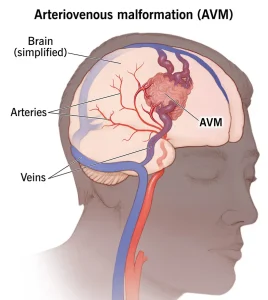Overview
Diagnosis
Intracranial venous malformations are often discovered accidentally because many people do not experience symptoms. They may be detected during imaging tests performed for other neurological concerns. These tests help visualize the blood vessels and brain tissue in detail and can identify abnormalities in veins or related structures.
Common imaging tests include:
-
CT scan
-
MRI
-
MRA
-
MRV
These tests allow healthcare professionals to evaluate blood flow, identify venous abnormalities and rule out other neurological conditions.
Treatment
Intracranial venous malformations rarely require treatment because they typically do not cause symptoms. When symptoms do occur, such as headaches, medicines may be prescribed for relief. In uncommon cases, seizures or brain hemorrhages can occur due to other vascular issues found near the venous malformation. Seizures are usually managed with medication.
Some hemorrhages may require surgery, but many can be treated with close medical monitoring and supportive care in a hospital setting.
Preparing for a Medical Appointment
If symptoms are present, a neurologist or neurosurgeon may evaluate the condition further. Preparing for your appointment can help ensure you get the most benefit from the visit. Consider the following:
-
Ask about any necessary restrictions before the appointment
-
Write down symptoms and when they began
-
List major life changes or stresses
-
Bring a list of medicines, supplements and doses
-
Bring a family member or friend
-
Prepare a list of questions for your healthcare team
Helpful questions include:
-
What could be causing my symptoms?
-
What tests are needed for diagnosis?
-
What treatment options do I have?
-
What results can I expect?
-
What follow-up care is needed?
What to Expect from Your Healthcare Professional
During the evaluation, your healthcare professional may ask questions such as:
-
When did your symptoms begin?
-
Are your symptoms constant or occasional?
-
How severe are your symptoms?
-
What improves or worsens your symptoms?
Providing clear answers helps guide diagnosis and treatment planning.
Advertisement

